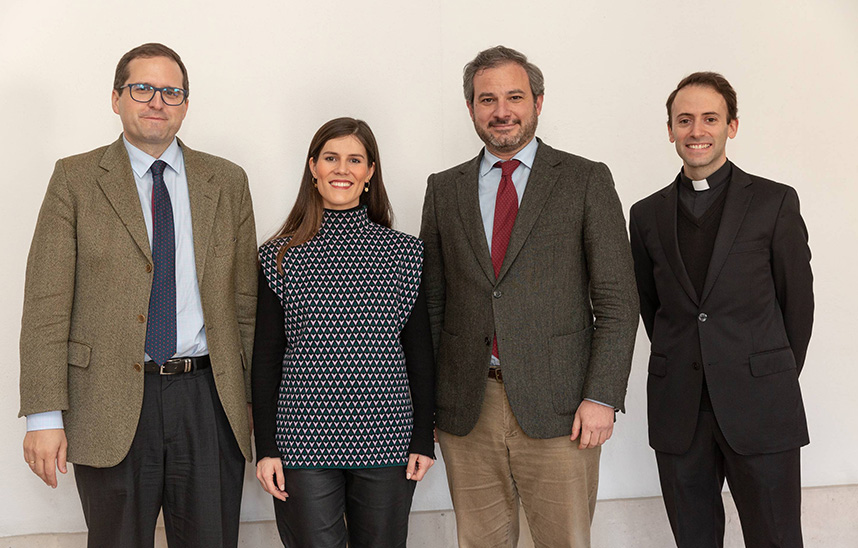"In the Christian baggage we can find answers to the questions of our time."
Ricardo Calleja, professor at the University of Navarra, presents a book that is a compendium of Benedict XVI's reflections on contemporary culture.

FotoManuelCastells/Professors Torralba, Escauriaza, Calleja and Brugarolas intervened in the presentation of the book, an event organized by the Master's Degree in Christianity and Contemporary Culture of the University of Navarra.
The University hosted the presentation of the book "Vivir como si Dios existiera. A proposal for Europe," by Ricardo Calleja, professor at IESE and Master's Degree in Christianity and Contemporary Culture at School of Philosophy and Letters of the academic center. The book brings together and analyzes some of the central texts written by Benedict XVI and invites believers and non-believers alike to reflect on the foundations and future of European culture, considering the contribution of Christianity and its intellectual tradition.
Grouped around five major themes -wounded by the desire for God; God is love; the truth will set you free; as if God existed; and roots: reason, religion and politics-, its pages deal with issues such as suffering and beauty; truth and freedom; faith and reason; and the roots of Europe. "Benedict XVI speaks of the Church of the future, made up of people who do not have recipes, but who try to give answers to new problems with the usual messages, without canning them. For this it is necessary to read and think, and this is precisely the purpose of the book: to reflect on the meaning of existence and the foundations of common life," explained the author.
At the presentation, which was attended in person and online by more than 900 people from the five continents, Ricardo Calleja was accompanied by professors José María Torralba, Full Professor of Philosophy, and Miguel Brugarolas, professor of School of Theology. The roundtable was moderated by Ana Escauriaza, professor of Master's Degree in Christianity and Contemporary Culture.
In his speech, the author pointed out that the death of Benedict XVI and the publication of this and other books that have been written on his thought "entail a call to analyze contemporary reality and to find in the Christian baggage answers to the questions of our time and to let God work". The monograph, published by Ediciones meeting, is part of the collection "Pensar Europa" (Thinking Europe). In this sense, Calleja encouraged those present "to think together with those who think like us and with those who start from different premises, because if the word we have known is true, we will be able to find the way to communicate it without imposing it and without closing in on ourselves.
This was followed by Professor Brugarolas, who stressed the "profound balance" in the thought of Benedict XVI, "known as the Pope of reason, but with a great heart" and mentioned what he proposed and what is recalled in the book, "to unite faith and love, putting Christ at the center, without limiting himself to transmitting a doctrine, because a love Closed for the truth ends up diluted in good feelings and turns against the person".
For his part, José María Torralba also highlighted the way in which Ricardo Calleja synthesizes and organizes in the book the vision that the Pope had on different questions of social life "where the function of religion should not only be to generate motivation but also to shed light. According to him, "religion makes an irreplaceable contribution at the root of our society, promoting values such as dignity and the common good", which is why he encouraged Christians "to participate in the public sphere".
